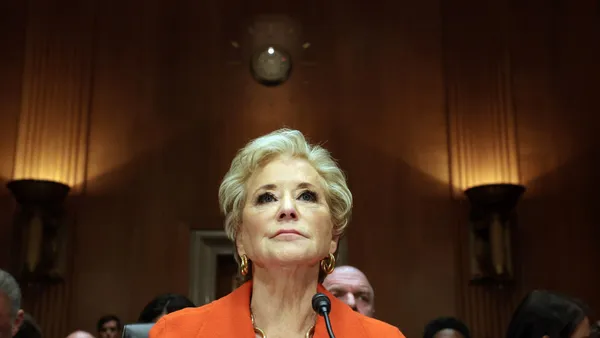Dive Brief:
- Johns Hopkins University and the California Institute of Technology agreed to pay a combined $35.3 million to settle claims that they engaged in a price-fixing scheme with other top-ranked colleges, according to court documents filed Friday.
- An ongoing class-action lawsuit against 17 prestigious colleges alleges they violated antitrust law and drove up the cost of college by unlawfully collaborating to lower the financial aid they offer to students.
- Johns Hopkins will pay $18.5 million, and Caltech will pay just under $16.8 million, pending judicial approval of the settlements. Both institutions denied the allegations in their settlements.
Dive Insight:
The 17 plaintiffs in the case all once belonged to the 568 Presidents Group — a now-defunct consortium whose members collaborated on their financial aid systems. Prior to September 2022, a federal statute allowed colleges to work together on their financial aid formulas if they practiced need-blind admissions, meaning they do not consider applicants’ ability to pay.
The group dissolved shortly after the statute did.
But by then, the damage had been done, alleged the lawsuit. The case, brought by students and graduates, argues that financial aid decisions by the named colleges weren’t truly need-blind. The institutions instead gave preferential treatment to the applications of students of past and potential donors and considered the financial circumstances of transfer students and those on the waitlist, making the colleges ineligible for the statute's need-blind exemption, the lawsuit alleged.
Caltech and Johns Hopkins had the shortest tenures in the 568 Group. Caltech belonged for two years, while Johns Hopkins joined just two months before the lawsuit was filed in 2022.
The colleges sought to have the case dismissed, maintaining they have need-blind admissions policies. But the U.S. Department of Justice challenged some of their arguments. A federal judge allowed the lawsuit to move forward shortly thereafter.
In August 2023, the University of Chicago became the first institution to settle, agreeing to pay $13.5 million — so far the smallest payout among the plaintiffs. The private university did not admit wrongdoing.
Ten more institutions had followed, bringing the total settlement pot to $284 million before Friday's filings. The settlement firm in charge of handling settlement payouts has received over 68,000 claims it considers valid, according to those most recent filings.
Johns Hopkins and Caltech's settlements will bring the total settlement pot to just under $319 million, a “remarkable result,” lawyers for the plaintiffs said Friday.
The two deals came after "over two years of hard-fought litigation, including significant fact discovery, and after several months of extensive arm’s length negotiations," they said in court documents.
Caltech on Tuesday said it is "pleased to be able to focus our time and resources" on educating students.
"We meet the full demonstrated need of all admitted domestic students through our need-blind admissions process, and we are unwavering in our commitment to ensure that a student’s socioeconomic status is not a barrier to a Caltech education," the university said in a statement.
Johns Hopkins did not immediately respond to a request for comment Tuesday.
Pending the approval of the Johns Hopkins and Caltech deals, the 12 institutions that have settled include:
- Brown University for $19.5 million.
- California Institute of Technology for $16.8 million.
- University of Chicago for $13.5 million.
- Columbia University for $24 million.
- Dartmouth College for $33.8 million.
- Duke University for $24 million.
- Emory University for $18.5 million
- Johns Hopkins University for $18.5 million.
- Northwestern University for $43.5 million.
- Rice University for $33.8 million.
- Vanderbilt University for $55 million.
- Yale University for $18.5 million.
However, the lawsuit alleges that the remaining plaintiffs — Cornell University, Georgetown University, Massachusetts Institute of Technology, the University of Notre Dame and the University of Pennsylvania — are the driving forces behind the price-fixing scheme.
"The five non-settling Defendants had some of the longest tenures in the 568 Group and are alleged to be among the most centrally and consistently involved," Friday's court filing said.
Georgetown President John DeGioia chaired the 568 Group for a majority of its existence — 2009 to its dissolution in 2022. The lawsuit cited his leadership when labeling Georgetown as the "ringleader" of the alleged antitrust scheme. DeGioia, Georgetown's longest-serving leader, resigned as the institution's president last year amid health concerns, though he remains at Georgetown as president emeritus and a faculty member.
The lawsuit also noted that Cornell and the University of Pennsylvania were the two largest members of the 568 group, while MIT, Notre Dame and the University of Pennsylvania were among those with the largest endowments.















